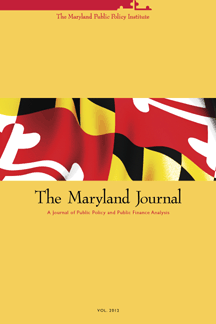
Maryland Public Policy Institute Releases 2012 Edition of The Maryland Journal
(ROCKVILLE, MD) – The Maryland Public Policy Institute today released the 2012 edition of The Maryland Journal, the Institute’s yearly compendium of state-specific research edited by prominent Johns Hopkins University economist Steve H. Hanke. As with last year’s inaugural edition, this year’s Journal offers original analysis from leading thinkers in market-oriented public policy.
<> In “The Appearance of Fiscal Prudence,” Eileen Norcross, lead researcher for the State and Local Policy Project at the Mercatus Center at George Mason University, and Mercatus Masters Fellow Benjamin J. Vanmetre, examine the 2010 recommendation by Maryland’s Spending Affordability Committee (SAC) that responsibility for reducing the state’s massive structural deficit be turned over to the Governor and General Assembly. Norcross and Vanmetre deconstruct the SAC’s decades-long inability to rein in state spending, and argue that the Committee’s call for spending discipline offers a clear signal that the SAC should be abolished, and replaced with a “clear, transparent, and easy to evaluate spending rule” to guide the state’s budget deliberations.
<> Maryland Public Policy Institute Senior Fellow Gabriel J. Michael and Maryland Tax Education Foundation Chairman Jeff Hooke deconstruct the taxpayer subsidies for the initial phase of Baltimore City’s massive State Center project in “State Center, Phase I – The $127 Million Taxpayer Handout.” While the mixed-use project has come under both political and legal fire for its scope and expense, Michael and Hooke attempt to account for the project’s potential cost to the public. What they find is that Maryland taxpayers will be stuck with a nine-figure bill – a “significant commitment of public resources for the primary benefit of private developers.”
<> In “Making the Best of a Bad Situation,” Maryland Public Policy Institute Senior Fellow Marc Kilmer discusses how Maryland should approach a health insurance exchange. With the 2010 passage of the Patient Protection and Affordable Care Act came new regulations on the sale of insurance. Also within the law: directives requiring states to establish new marketplaces for consumers to purchase health insurance. Kilmer points to federal guidelines that somewhat hamstring the ability of the states to operate in a “consumer-friendly” way, but calls on the state to “allow insurance companies maximum freedom to design and price” insurance policies. He asserts Maryland’s consumers and business owners will be far better served by a mechanism that doesn’t impose heavy regulation.
<> In “Maryland Death Taxes,” attorney David S. Rosen looks at the state’s estate and inheritance provisions, and declares them to be “an incentive to move anywhere but here.” As one of only two states that impose both an estate and an inheritance tax, Rosen argues that current policy “drives away wealthy Marylanders and imposes administrative burdens on many modestly wealthy families, small business owners, and entrepreneurs.” The consequences of this end-of-life cash grab are far-reaching. As technology allows for greater mobility, Rosen contends, more and more Marylanders will protest with their feet.
<> In “Promoting Youth Employment in Maryland,” Baltimore attorney George W. Liebmann points to the state’s staggering rate of youth unemployment, and warns that last year’s riots and violent flash mobs in London and Philadelphia can in no small part be traced back to the devil finding work for idle hands. He criticizes the O’Malley administration for ignoring youth unemployment, and offers suggestions for improving the jobs landscape.
“This year’s Maryland Journal is an ambitious, far-reaching examination of some of the state’s thorniest – and most expensive – issues,” said Maryland Public Policy Institute president Christopher Summers. “We have chosen topics that impact every Marylander – from taxes, to spending, health care and the budget – and have sought to provide some much-needed clarity to cut through the smoke and spin that too often clouds these crucial issues. Marylanders deserve to know where, how, by whom, and for whom their hard-earned tax dollars are being spent. We’ve attempted to answer some of these questions.”






